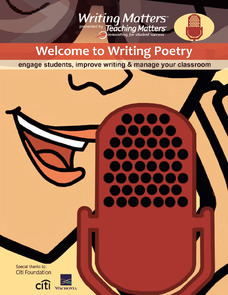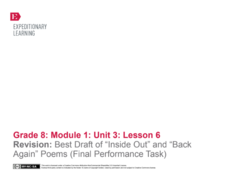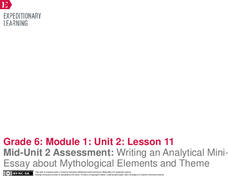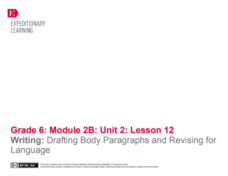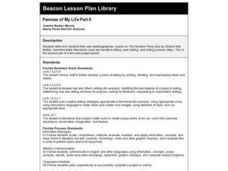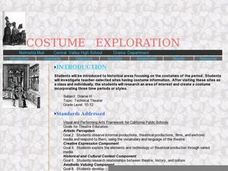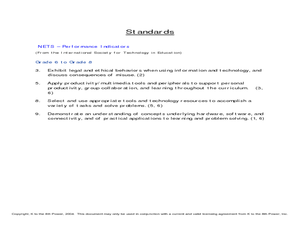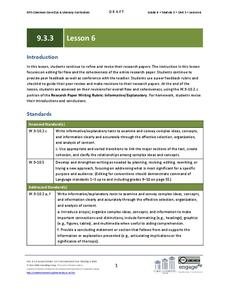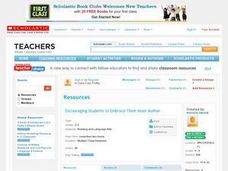Iowa State University
A Model of Learning Objectives (Revision of Bloom's Taxonomy)
What would a three-dimensional representation of Bloom's revised taxonomy of the cognitive domain look like? Get a glimpse of the complex classification system that is frequently referenced in education to distinguish levels of...
EngageNY
Writing Dialogue: Revising Historical Narrative Drafts to Add Dialogue
Young writers have written, revised, and peer-edited their historical fiction narratives by the 10th lesson plan in a language arts unit. Fourth graders finally combine their revision notes to create a second draft. The double-spaced...
EngageNY
Our Group Readers Theater: Revision, Conclusion, and First Rehearsal
Revision is the key to great writing. Individuals revise their readers theater scripts and write a group conclusion. Scholars then perform their scripts for another group and receive feedback.
MENSA Education & Research Foundation
The Writer’s Toolbox: What You Need to Master the Craft
Strengthen your high schoolers' writing with a series of steps for writing successfully. With sections on organizing an essay, choosing a topic, crafting a thesis statement, and revising a draft, the lesson plan encourages your class to...
Teaching Matters
Welcome to Writing Poetry
Your pupils are poets, and now they'll be able to show it with the exercises in this packet. The lessons, designed for beginner, intermediate, and experienced poets, not only feature a variety of poetic forms, but take...
EngageNY
Revising for Organization and Style: Bold Beginnings
Get young writers thinking about how to write a great beginning for their narratives. After examining examples of solid beginnings in literary text, young writers discuss the criteria for a compelling introduction. Then, independently,...
EngageNY
Revising the Informative Consumer Guide: Sentence Structure, Transitions, and Works Cited
Transitions are the glue that link paragraphs together. Pupils listen to a mini lesson plan on sentence structure and transitions and use what they learned to revise their informative consumer guides. Next, they self-assess their writing...
EngageNY
End of Unit 2 Assessment, Part 2: Revise Essay Drafts
Positive feedback is a great way to improve writers' skills. Scholars receive their draft essays back with teacher comments and start the revision process. Next, they prepare to begin their final drafts at home.
EngageNY
Revision: Best Draft of “Inside Out” and “Back Again” Poems (Final Performance Task)
Scholars read their poems to their research teams as their final performance task. The teams listen and give feedback on the flow between the two poems. Writers then take the feedback from their teams and revise their poems before...
EngageNY
End of Unit Assessment, Part 1: Revising Claims and Evidence Based on Feedback
Revisit, revise. Scholars receive their position papers returned with feedback from the teacher. They use colored pens to identify feedback related to the first two rows of the rubric and correct their papers based on the comments....
Curated OER
Man's Search For Meaning: Writing Assessment (Final Multi-Genre Project)
Conclude a study of Viktor Frankl's Man's Search for Meaning with a research project that asks readers to investigate what various religions and philosophies believe is the meaning of life. The resource packet includes a list of...
EngageNY
Planning for Writing: Introduction and Conclusion of a Literary Argument Essay
After completing three body paragraphs of an argument essay about life's rules to live by from Bud, Not Buddy Christopher Paul Curtis, it's time to begin writing the introduction and conclusion. Independently, pupils draft the final two...
K20 LEARN
A Way With Words: Copy Editing And The Writing Process
Learning to edit copy using correct grammar and mechanics is an essential skill in school—where scholars are called upon to edit their peers' writing—and in business. Class members practice this skill by first editing a provided article...
K20 LEARN
Who Am I? Creating And Editing Descriptive Writing
With descriptive writing, the pleasure is in the details. Young writers learn how to add sensory details to a paragraph about themselves. They read a short paragraph and identify the sensory details used. After revising their draft...
EngageNY
Mid-Unit 2 Assessment: Writing an Analytical MiniEssay about Mythological Elements and Theme
Two is company. Scholars pair up to continue their mini essay writing from the previous instructional activity. They work on their introduction and conclusion paragraphs and then trade partners for peer feedback and a fresh set of eyes...
EngageNY
Writing: Drafting Body Paragraphs and Revising for Language
This is a formal affair. Scholars take a look at using formal writing in essays. They analyze the model essay Are We Medieval?: Opportunities in the Middle Ages and Today? They then begin working on the first draft of their own...
EngageNY
Peer Critique and Pronoun Mini-Lesson: Revising Draft Literary Analysis
See what peers really think. Scholars give a peer critique of the their essay drafts from the previous lesson plan. They then participate in a mini lesson plan about pronouns. Pupils write examples of each type of pronoun on sticky notes...
Curated OER
Pennies of My Life Part II
Youngsters write and construct their own autobiographies based on The Hundred Penny Box by Sharon Bell Mathis. They engage in pre-writing steps, narrative writing, and peer editing. This is the second part of a two-part project lesson.
Curated OER
Costume Exploration
What a great lesson, upper graders are sure to love. They explore costume design and the relationships between theatre, culture, and history. They research three time periods, write a response about two of them, then create a composit...
Curated OER
Revise and Edit Writing
Seventh graders write, revise, and edit a letter and a story. In this revising and editing lesson plan, 7th graders learn the differences between revising and editing by doing the two to a letter and eventually a story.
EngageNY
Group Discussions and Revision: Editorial Essay
Great minds think aloud! Pupils participate in the Fishbowl protocol, discussing their opinions about the Mary River mine proposal. As they share their thoughts, peers provide feedback about their thesis and supporting ideas.
EngageNY
Grade 9 ELA Module 3, Unit 3, Lesson 6
The eighth lesson in the editing process focuses on flow and cohesiveness in the entire research paper. Class members examine color-coded pre- and post-revision model paragraphs and then work in pairs to revise and peer-review their papers.
Millard South Patriots
Trait Practice: Sentence Fluency
Do your young writers need a little help varying their sentence structure? Have them work on common errors, sentence fluency, and writing patterns with a series of language arts activities. The resource includes reading passages as well...
Curated OER
Encouraging Students to Embrace Their Inner Author
Everyone is a writer! Youngsters compose an original piece of writing. In this writing lesson, they come up with their own idea for a piece of writing, revise it, and then publish it with illustrations. This lesson includes three...
Other popular searches
- Making Revisions in Writing
- Writing Revisions Methods
- Writing Revisions Edition
- Writing Revisions Edison
- Writing Revisions Edision






